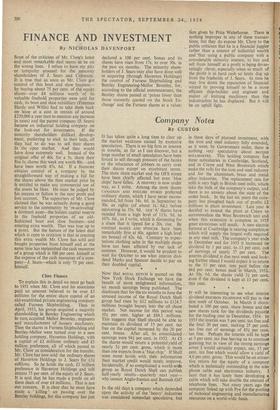FINANCE AND INVESTMENT
By NICHOLAS DAVENPORT
SOME of the criticism of Mr. Clore's latest and most remarkable deal seems to be on ' the wrong lines. I refuse to have my pity or sympathy aroused for the minority shareholders of J. Sears and Company. It is true that as soon as Mr. Clore got control of this boot and shoe business— by buying about 75 per cent. of the equity shares—over £4 millions worth of its valuable freehold properties were sold for• cash, its boot and shoe subsidiary (Freeman Hardy and Willis) had to take them back on lease at a cost in rentals of around £250,000 a year (not to mention any increase in rates) and the parent company (J. Sears) became an industrial holding company on the look-out for investments. If the minority shareholders disliked develop- ment, preferring to stick to their lasts, all they had to do was to sell their shares in the open market. And they would have done extremely well. Instead of the original offer of 40s. for a 5s. share their five ls. shares this week are worth 80s.—and, have been worth 87s. 6d. If a financier obtains control of a company by the Straightforward way of making a bid for the shares above the then market price he is entitled to make any commercial use of the assets he likes. He must be judged by his success or failure in the next profit and loss account. The supporters of Mr. Clore claimed that he was actually doing a good service to the community by 're-activating' a dormant asset—the hidden capital reserve in the freehold properties of an old- fashioned boot and shoe business—and creating extra wealth. That was true up to a point, But the feature of the latest deal which is open to criticism is that in creating this extra wealth Mr. Clore has sold and bought properties from himself and at the same time has replenished the cash resources of a group which is 100 per cent. himself at the expense of the cash resources of a com- pany—J. Sears—which is only 75 per cent. himself.
Gore Finance To explain this in detail we must go back to 1951 when Mr. Clore and his associates paid an amount believed to be over £3 millions for the entire share capital of an old-established private engineering company
called Furness Shipbuilding. Then in April, 1953, his group acquired a majority shareholding in Bentley Engineering which in turn, acquired Mellor Bromley, engineers and 'manufacturers of hosiery machinery. Then the shares in Furness Shipbuilding and Bentley-Mellor were turned over to a new holding company, Haverton Holdings, with a capital of £2 millions ordinary and £1 Million preference, all of which passed to Mr. Clore as consideration for the transfer. Mr. Clore has now sold the ordinary shares of Haverton Holdings to J. Sears for £31 millions. So he holds the cash, £1 million preference in Haverton Holdings and still retains 75 per cent. of the equity of J. Sears. It is said that he has made a profit on all these deals of over £4 millions. That is not our concern. It is clear that he must have made a ' killing ' on passing over the Bentley holdings, for this company has just
declared a 100 per cent, bonus and its shares have risen from 17s. to over 30s. in the past six months. The minority share- holders of J. Sears may also have done well in acquiring (through Haverton Holdings) the control of Furness Shipbuilding and Bentley Engineering-Mellor Bromley, for, according to the official announcement, the Bentley shares passed at 'prices lower than those currently quoted on the Stock Ex- change' and the Furness shares at a valua-
tion given by Price Waterhouse. There is nothing improper in any of these transac- tions, but they do expose Mr. Clore to the public criticism that he is a financial juggler rather than a creator of industrial wealth and -that using a public company with a considerable minority interest, to buy and sell from himself at a profit is being devas- tatingly clever, especially when so much of the profit is in hard cash so lately dug up from the freeholds of J. Sears. In time he may live down the reputation of financial wizard by proving himself to be a more efficient ship-builder and engineer and maker of knitting machinery than the industrialists he has displaced. But it will be an uphill fight.


































 Previous page
Previous page